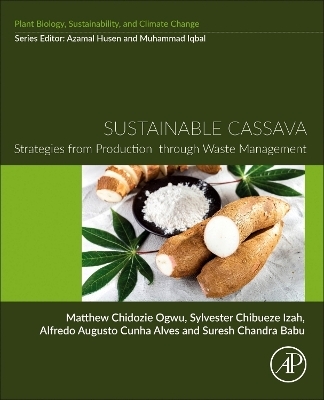
Sustainable Cassava
Academic Press Inc (Verlag)
978-0-443-21747-0 (ISBN)
Dr. Ogwu is an Assistant Professor of Sustainable Development and Integrated Ecology at Appalachian State University, United States of America. He obtained his Ph.D. in Biological Sciences from Seoul National University, M.Sc (Distinction) and B.Sc. (First Class) in Plant Diversity and Conservation and Plant Biology and Biotechnology respectively from the University of Benin, Nigeria. Dr. Ogwu is an interdisciplinary academic with numerous awards and scholarships to his name. His research focuses on the assessment of coupled human and natural systems and socio-ecological systems for sustainable environmental development and includes soil microbial and geographical ecology, economic plant characterization for breeding and conservation, ethnobotany, and biodiversity issues and policies. Dr. Ogwu has published over 100 peer-reviewed works and has presented his results at different international conferences. He leverages his education, skills, and experience to develop environmental management and sustainable food security policies. Dr. Izah possesses a Ph.D. in Applied Microbiology and Environmental Health, M.Sc. in Applied Microbiology, and B.Sc. in Biological Sciences from Niger Delta University, Nigeria. Dr. Izah worked in an Environmental Consultancy firm for over six years focusing on soil, water, and atmospheric assessment. He has carried out studies on vegetation cover and biodiversity concerning species diversity and composition in the course of his early career. Dr. Sylvester Izah is presently a Lecturer at the Bayelsa Medical University, Yenagoa, Nigeria. Dr. Sylvester Izah has an impressive research and publication record in the field of Applied Biological Research including Applied Microbiology, Biotechnology, Public and Environmental Health, Risk Assessment, Bioenergy, Toxicology, and Biodiversity studies. Dr. Izah has over 220 peer-reviewed publications including edited books. Presently his research is focusing on Applied Microbiology, Environmental Health, Food Science and Hygiene. Dr. Alves holds his degree in Agronomy from the College of Agricultural Sciences of Pará, Brasil; Master’s degree in plant physiology by Federal University of Viçosa Minas Gerais, Brasil; and Ph.D. in Plant Physiology from Cornell University, Ithaca-NY, USA. He has served as Visiting-Scientist in the International Center for Tropical Agriculture, Cali, Colombia, acting as Coordinator of the Cassava Biotechnology Network for Latin America and the Caribbean. As Senior Scientist at Embrapa-Labex-USA in Genetic Resources, he has also worked at the National Center for Genetic Resources Preservation, ARS / USDA, Fort Collins, Colorado, USA. Since 1987 he has been Scientist at Embrapa Cassava & Fruits, , where he is currently cassava team leader and international affairs supervisor. His agronomy experience emphasizes cassava physiology, working on abiotic stresses tolerance (particularly drought), biotechnology (molecular markers, tissue culture and cryopreservation), pre-breeding and cassava genetic resources preservation. Dr. Babu is Senior Research Fellow and Head of Capacity Strengthening at IFPRI (USAID FTF Innovation Lab for Food Security Policy) guiding IFPRI’s regional and country programs in their institutional and human capacity development activities. Before joining IFPRI, Dr. Babu was a research economist at Cornell University. He has published 20 books and monographs and more than 100 peer reviewed journal papers on food, agricultural, and climate change policies in developing countries. Dr. Babu has served or currently serves on the editorial boards of several leading academic Journals including, Food and Nutrition Bulletin; Food Security; Agricultural Economics Research Review; and African Journal of Agricultural and Resource Economics. Dr. Babu received his Ph.D. and M.S. both in Economics from Iowa State University, where he was awarded the Outstanding Young Alumnus Award for his services to global development
1. Sustainable Cassava Cultivation, Genetic Diversity, Productivity and Conservation Strategies 2. Cassava Produce and Products and their Potential Utilization and Environmental Security 3. Physicochemical, Morphological and Microbial Characterization of Cassava and Cassava Products 4. Threats to Cassava Cultivation, Production and Processing: Global Status and Sustainable Management Strategies 5. Sustainable Cassava Processing: Processes, Techniques, Wastes and Waste Streams 6. Global Trends in Cassava Trade, Econometrics, Governance Strategies and Product Management 7. Socio-economic Issues and Contributions of Cassava Production, Trade, Utilization and Management 8. Developing Sustainable Policy for Global Cassava Production, Trade and Utilization 9. Cassava as a Raw Material for Sustainable Bioeconomy Development 10. Biofuel (i.e., bioethanol, biogas, biohydrogen, etc.) Production from Cassava Processing By-products 11. Bioelectricity Production from Cassava Processing Wastes using Microbial Fuel Cells 12. Organic Acid Production from Cassava 13. Biosurfactant, Biofertilizer and Bioplastic film Production from Cassava-based Materials 14. Enzyme Production from Microorganisms isolated from Cassava Processing Wastes 15. Food and Feed Potentials of Cassava Processing Wastes 16. Volarization of Cassava Leaves and Parts 17. Quality Assessment and Environmental Risk Assessment of Cassava Processing Wastes Contaminants on the Ecosystem Quality 18. Cassava Wastewater Toxicity and Potential Effects on Terrestrial and Aquatic Organisms 19. Socio-economic Impacts of Cassava Processing Wastes 20. Meta-analysis of the Toxicological Potential of Cassava Processing Waste 21. Sustainable Processing Techniques for Cassava to Eliminate Cyanogenic Glycosides and other Toxic Compounds
| Erscheinungsdatum | 22.08.2024 |
|---|---|
| Reihe/Serie | Plant Biology, sustainability and climate change |
| Verlagsort | San Diego |
| Sprache | englisch |
| Maße | 216 x 276 mm |
| Gewicht | 1280 g |
| Themenwelt | Naturwissenschaften ► Biologie ► Ökologie / Naturschutz |
| Technik ► Lebensmitteltechnologie | |
| Weitere Fachgebiete ► Land- / Forstwirtschaft / Fischerei | |
| ISBN-10 | 0-443-21747-5 / 0443217475 |
| ISBN-13 | 978-0-443-21747-0 / 9780443217470 |
| Zustand | Neuware |
| Haben Sie eine Frage zum Produkt? |
aus dem Bereich


